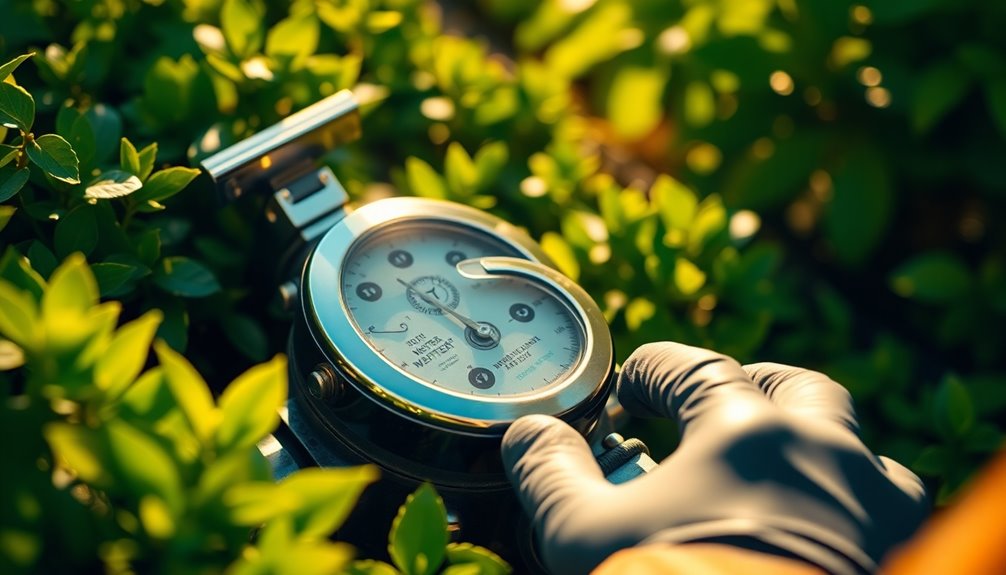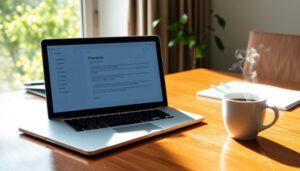To find your water meter for efficient utility billing, look near the curb or sidewalk, often in boxes labeled "water." In older homes, you might find it near the main supply line, while newer homes typically have them in utility areas. Carefully remove the cover to access the meter, keeping an eye out for pests. Regularly monitoring your meter readings helps detect leaks and track your water usage. By understanding how to interpret the measurements, you can manage your bills effectively. If you're curious about more tips and tricks, there's plenty more to uncover on this topic!
Understanding Water Meter Types
When it comes to finding the right water meter for your utility billing needs, understanding the different types is fundamental. There are two primary water meter types: positive displacement meters and velocity meters.
Positive displacement meters measure flow by capturing a specific volume of water. They include nutating disc and piston meters, which are known for their accuracy, especially at low flow rates. This makes them ideal for residential applications where precise measurement of water consumption is essential. Additionally, accurate expense tracking can help utilities monitor operational costs associated with water usage. Furthermore, using efficient expense management apps can streamline the process of tracking these operational costs.
On the other hand, velocity meters calculate flow based on the speed of the water moving through them. They encompass turbine, venturi, orifice, and ultrasonic meters, each suited for different scenarios.
Velocity meters typically perform better in larger commercial settings where high flow rates are common. Expense tracking tools can also enhance financial management for businesses by providing insights into operational costs associated with utility usage.
Choosing the right water meter type is important for effective utility management. Each type has unique operational characteristics that can impact billing accuracy and responsiveness.
Locating Your Water Meter
Locating your water meter is essential for monitoring your water usage and managing utility billing effectively. Typically, water meters are positioned near the curb or sidewalk at the front of your property, often in a concrete or plastic box labeled "water." If you live on a corner lot, you might find the meter on the side of your house.
For older homes, the meter is usually located near the main water supply line, whereas newer homes often house them in utility areas like basements or garages. Regularly checking your water meter can help you stay on top of your bill tracking tools and manage usage efficiently. Utilizing budget apps can also enhance your ability to monitor your expenses related to utility bills.
To access the meter, you'll need to carefully remove the cover from the meter box. Use tools for this task and be cautious of any pests that might be hiding inside.
If you're having trouble finding your water meter, don't hesitate to consult your utility company. They can provide specific guidance tailored to your property. Additionally, reviewing property inspection documents might help you pinpoint the location.
Consider setting up automated bill payment notifications to help stay organized with your utility bills.
Reading Water Meter Measurements
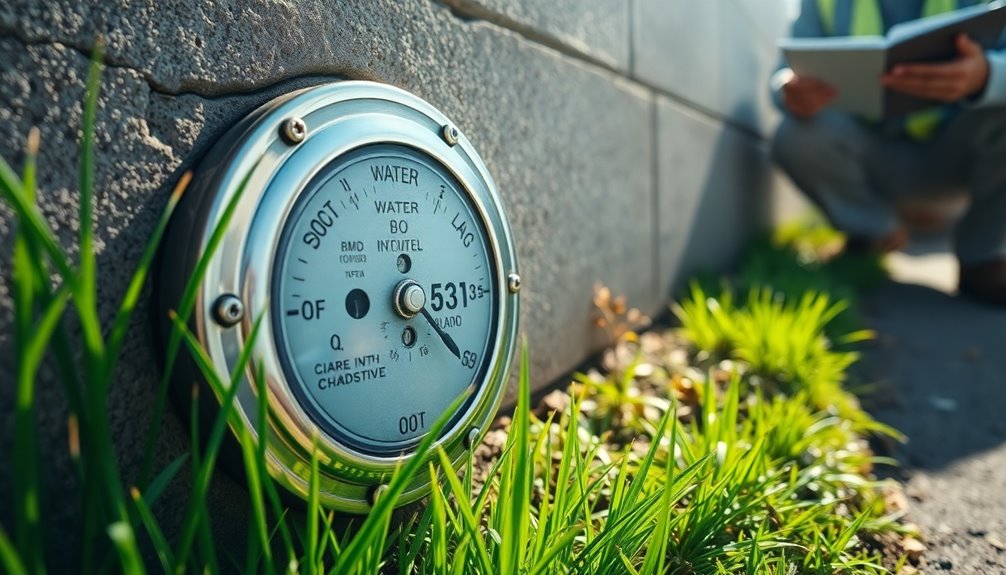
Understanding how to read your water meter is essential for managing your water usage effectively. By regularly checking your meter reading, you can gain valuable insights into your consumption patterns and detect leaks early. Here's how to get started:
- Identify Your Meter Type: Familiarize yourself with whether you have an analog or digital water meter. Analog meters feature dials, while digital meters display numerical readings.
- Read the Meter: For analog meters, observe the position of the sweep hand. For digital meters, simply note the numbers displayed. Confirm you check in good lighting, as some may require a flashlight for visibility. Utilizing budgeting apps can help you keep track of costs associated with water usage, as many apps offer receipt scanning features to enhance accuracy in expense reporting.
- Monitor Regularly: Regularly monitoring your meter readings helps you spot unusual spikes in water usage, which could indicate leaks or inefficiencies in your plumbing system.
- Check for Low Flow Indicators: If your analog meter has a low flow indicator, it can signal water movement even when appliances are off, helping you detect leaks early. Additionally, tracking your water usage can enhance your overall financial management and resource allocation.
Monitoring Water Usage Effectively
Monitoring your water usage effectively is key to maintaining both your budget and the environment. Regularly checking your water meter readings, whether it's analog or digital, helps you track daily water usage and spot any unexpected spikes that could indicate leaks or inefficiencies. Understanding how to read the meter, especially the measurement units like Centum Cubic Feet (CCF) or gallons, is essential since one CCF equals 748 gallons.
Consider conducting a leak detection test by monitoring your water meter during a period of inactivity. This can reveal hidden leaks, allowing you to address issues before they escalate into higher bills. Additionally, using a tool like Google Shopping can help you compare prices for water-saving devices, ensuring you find the best deals available.
Utilizing smart meters enhances this process; they allow for real-time tracking of water consumption and alert you to unusual usage patterns, making it easier to practice water conservation. Additionally, using tools like price comparison tools can help you find cost-effective options for upgrading to smart meters, maximizing your savings while improving efficiency.
Calculating Your Water Bills
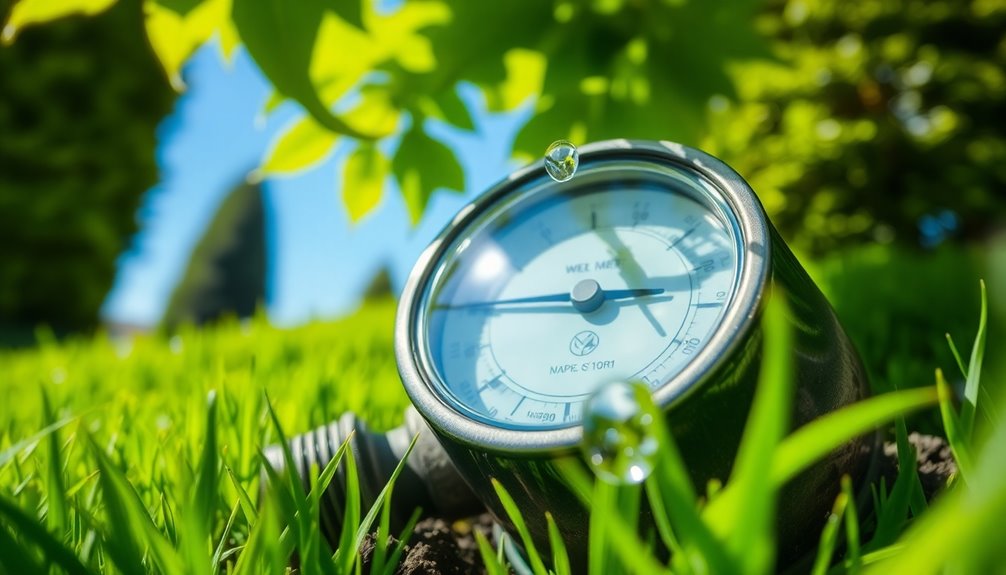
Your water bill reflects how much water you've used, and calculating it accurately can save you money and help you manage your expenses.
Understanding your bill is essential, and here's how to do it effectively:
- Check Your Meter Readings: Regularly monitor your water meters to track current and previous readings. This helps you calculate your total water usage.
- Know Your Units: Water usage is often measured in Centum Cubic Feet (CCF) or gallons. One CCF equals 748 gallons, so make sure you understand the units your utility provider uses. Additionally, using price comparison tools can help you find the best rates for utility services, ultimately leading to savings on your bills.
- Calculate Your Usage: Subtract the previous meter reading from the current one to determine your total water usage.
- Multiply by the Rate: To find the total amount on your water bill, multiply your water usage by the rate charged per unit by your utility provider. Effective use of these tools can enhance informed decision-making during your shopping for utility services.
Leak Detection Techniques
Accurate water usage calculations can only go so far if leaks are silently inflating your bills. To effectively tackle this issue, start with simple leak detection techniques.
Turn off all your water-using appliances for a few hours, then monitor your water meter. If you notice movement, it's a sign of a potential leak. For analog meters, keep an eye on the sweep hand; if it moves while everything's off, you've got a leak. Digital meters will display flow rates even when no water is being used, making them easier to monitor. Implementing clear payment terms can help you manage any unexpected increases in your utility bills.
Regular checks of your water meter can reveal unusual spikes in usage patterns that may indicate hidden leaks. Additionally, using a low flow indicator on analog meters can help pinpoint slow leaks, as they detect even minor flows.
If you want to take it a step further, consider implementing smart water meters. These advanced devices provide real-time alerts for unusual usage patterns, enabling you to detect and address leaks more efficiently. This proactive approach aligns with continuous monitoring to ensure your utility expenses remain under control.
Resources for Further Assistance
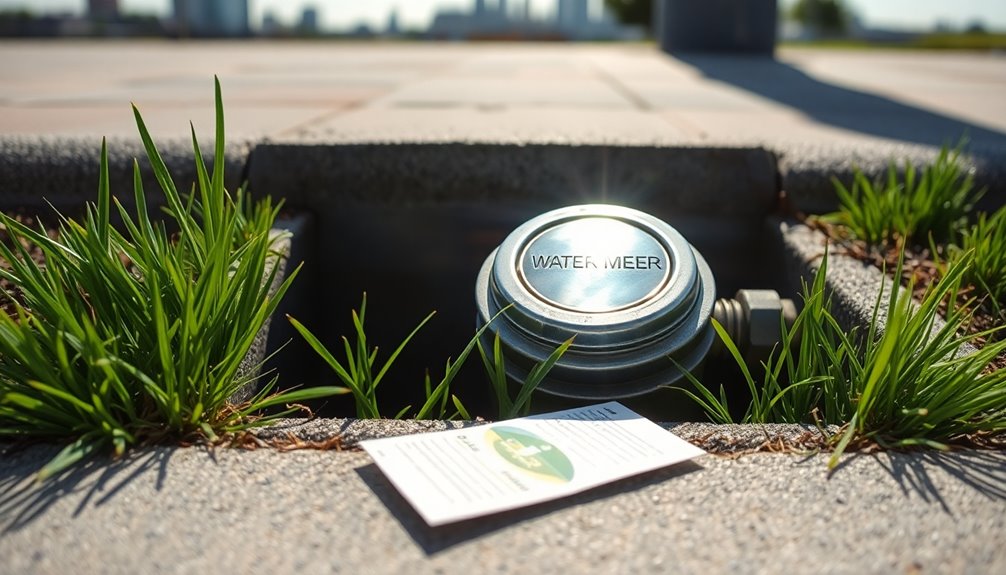
Finding the right resources can make a notable difference in addressing water meter concerns and billing issues. Using these tools, you can enhance your understanding and resolve any queries about your total usage effectively.
- Inframark, LLC: For billing information and assistance, contact them at 832-467-1599. They provide valuable resources and FAQs for water meter inquiries.
- Houston Public Works Website: Check out their detailed guides on water meter reading and billing processes. This can notably enhance your customer service experience.
- Community Meetings: Attend local meetings to engage directly with utility representatives. You'll have the opportunity to ask questions and get updates on water services.
- Accessibility Inquiries: For specific questions about water meters, reach out at 713-860-6400 or via email. They'll respond promptly to your inquiries.
If you encounter an emergency related to water services, don't hesitate to dial 9-1-1.
For non-emergency issues, contact the Harris County Sheriff's Office at 713-221-6000. These resources are here to support you in managing your water meter needs effectively.
Conclusion
By understanding your water meter and how it works, you're not just keeping tabs on your usage—you're steering the ship of your utility costs. With the right tools and awareness, you can navigate potential leaks and avoid unexpected bills. Remember, monitoring your water usage is like tending a garden; the more you nurture it, the better it flourishes. Stay proactive, and you'll reap the benefits of efficient billing and a healthier wallet.

